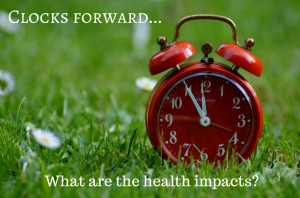You may be looking forward to longer days and lighter nights as Spring approaches and we put the clocks forward soon. But for some people Springtime brings increased sleep disruption. It’s important to be aware of the increased stress and health impacts that the time change can bring, particularly for those who already suffer from health and sleep issues.

4 ways to sleep better in Spring
Studies have shown increases in several adverse health outcomes during the days following the clock change, including sleep disruption, and increased rate of heart attack, stroke, depression, and traffic accidents.
Circadian rhythms and your sleeping pattern
The circadian rhythm (our ‘body clock’) regulates many physiological processes, and it receives important information from sunlight. If we suddenly start to experience changes in the timing of the sunlight we receive (which is the case when we disrupt our sleeping patterns by suddenly putting the clocks forward or back), this interferes with a range of biological processes.
What can we do about it?
Four natural ways to sleep better in Spring
1. Clocks forward for natural sleep
One of the simplest ways to get around these health stressors and start to sleep better is to gently ease your body into the new time change. Starting a few days or a week prior to the event, go to bed around five or ten minutes earlier each evening, so that you’re effectively giving yourself a ‘headstart’ on the new time and allowing your body the best possible chance to get enough sleep.
I’ve noticed that in the weeks preceeding the time change I quite naturally start to feel sleepier earlier in the evenings, and I find myself waking up earlier as the mornings grow lighter and the birds start singing at sunrise.
Try to follow and respond to your body as it navigates the change in seasons – it always knows best.
2. Reset your body clock
Get out and about as much as you can, away from the computer glare, and get as much natural daylight into your eyes as possible. The sunshine and daylight will help reset your circadian rhythms, keeping you in tune with Spring’s natural clock and helping you to sleep better.
Ideally, if you can be looking in the direction of the sky during sunrise and sunset, this will help give your body important messages and help it to gently reset its own internal clock, without the need of an alarm.
When you’re indoors, get those curtains open and minimise the amount of artificial light that you need.
3. Shift your eating habits
Pay attention to your appetite and notice if you feel hungrier at slightly different times of the day. You may feel like eating your meals a little earlier than normal in the days or weeks running up to the Spring time change, as your body begins to naturally adapt to the changing season. By doing this you can decrease the load on your digestive system and help your body to sleep better.
4. Give your body a rest
Think about minimising any stimulants such as coffee, tea, refined sugars and chocolate. When we use these kind of stimulants they mask our body’s messages to us that it needs to rest and sleep. Caffeine and sugar might give us that short-term boost, but we eventually need to pay this back – or suffer from long-term consequences such as adrenal fatigue.
It’s unfortunate that the Spring time-shift is so close to Easter Sunday, as it means that the shops are full of tempting Easter eggs – so it’s a difficult time to be foregoing chocolate!
It’s strange to think that the real reason for feasting at Eastertime is because we were supposed to be fasting for the previous month – but these days everyone conveniently forgets about the ‘fasting’ bit and skips straight to gorging on chocolate.
It’s also interesting to note the prevalence of colds and flu at this time of year. This is hardly surprising really, considering that sugar has been shown to suppress the immune system.
Give your body a Spring Clean
The Spring Equinox time is an excellent time to pay closer attention to your body and think about cleansing and detoxing. Spring-cleaning shouldn’t just be about our homes – after all, our bodies are our real homes for life, so they deserve an annual clear-out too.
If you’d like more help with cleansing your body for Spring, check out my ‘Hypnotherapy for healthy eating‘ program by clicking HERE.
Want to stay in touch with me and get tips and updates on how to have a calm mind and healthy body?
Then sign up for my newsletter – it also includes my free ‘Beat Stress & Anxiety’ online program.
Further reading and references:
Harvard Health: effect of light from electronic devices:
Prioritising sleep health:
http://journals.sagepub.com/doi/full/10.1177/1745691615598509#ref-27
Sleep disruption and depression:
https://journals.lww.com/epidem/Fulltext/2017/05000/Daylight_Savings_Time_Transitions_and_the.7.aspx
Light exposure for good health:
https://www.belsomra.com/static/pdf/light-early-in-the-day-boosts-sleep-at-night.pdf
Daylight savings and heart attacks:
http://www.nejm.org/doi/full/10.1056/NEJMc0807104
Effect of light exposure on brain:
https://www.ncbi.nlm.nih.gov/pmc/articles/PMC5299389/

Leave a Reply